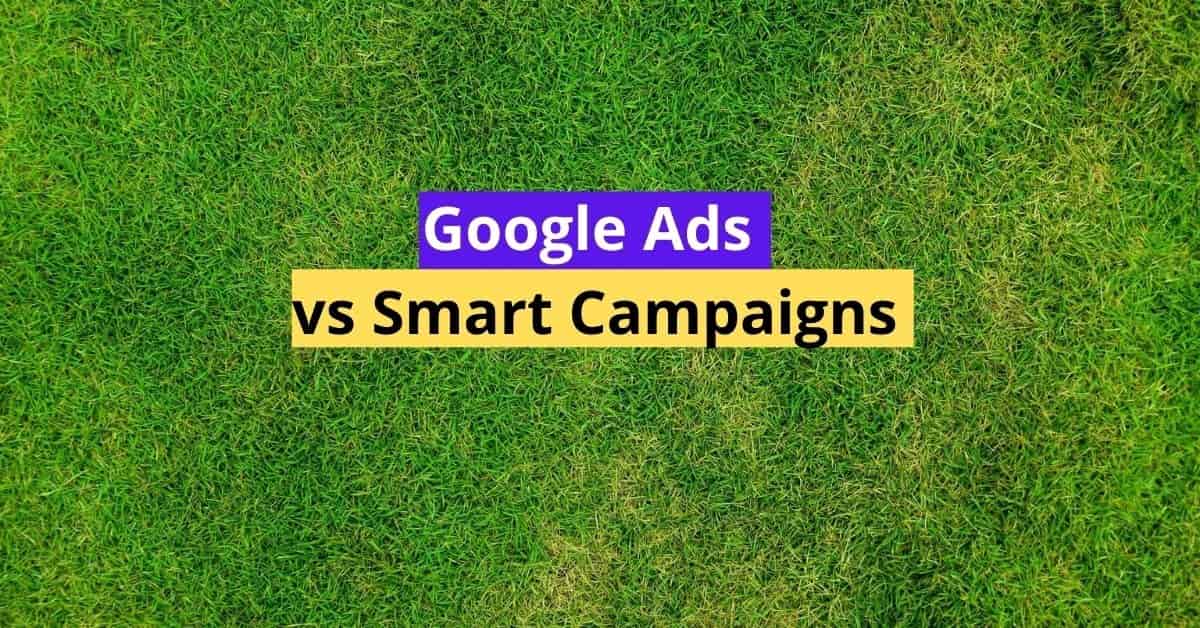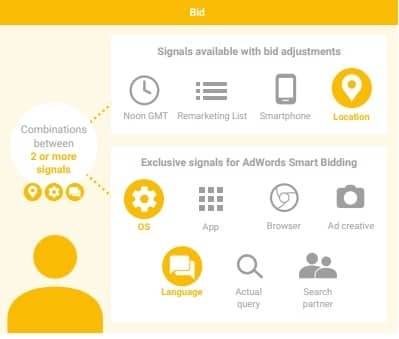Google Ads vs Smart Campaigns (9+ In-Depth Comparison Points)

Google is awesome! Its algorithm has to be one of the marvels of the digital world.
All you have to do is type a query in its search bar. No sooner than you finish typing, relevant results come up! And, it does this approximately 3.5 billion times per day!
Google displays a set of paid ads along with the organic results, probably millions and millions of times per day.
No wonder that digital marketers flock to Google. Any business, small, medium, or big, can benefit by using Google Ads to reach their target audience.
As long as you are complying with its ad policies, it’s more or less a level playing field.
You will need to be familiar with how to manage campaigns on your Google Ads account. To be honest, newcomers to the platform may have to deal with a steep learning curve.
The success of your ad depends on the details of your ad account. To top it all, Google has an auction-based bidding system. Your ad may not even be visible unless you are quite familiar with how it works!
Alternately, you can choose to go with Google Smart Campaigns. Here, you allow Google to do all the heavy lifting for you.
How does that fare in comparison to Google Ads? Let’s explore.
Manual vs. automatic
The basic premise of Smart Campaigns is that it is automatic. You don’t need more than 15 minutes to set up a campaign there.

On the other hand, it may take months to be familiar with Google Ads. It’s not free either. You might be wasting a lot of marketing dollars before you understand it fully.
Does that mean Smart Campaigns are better? It depends.
However, do remember that if you use Smart Campaigns, you lose access to a host of key features otherwise available on Google Ads.
In conclusion, Smart Campaigns is a better option for newbies. Experienced PPC marketers typically prefer the manual version of Google Ads.
Bidding and auction
You set your own budget in either scenario. If you choose Smart Campaigns, Google will decide how to spend this budget. It promises to do it in a way to drive the most value, but experienced marketers may not find it a convincing strategy.
For example, Google may automatically select a higher bid amount than that you will set up manually. After all, it’s more profitable from the perspective of Google!
However, from a marketers’ viewpoint, it may result in the rapid exhaustion of the marketing dollars.
The scenario is even more confusing given the fact that Google Smart Campaigns keeps most of the data to itself.

Setting up keywords
Google Ads is very specific on keywords. Marketers have to set it up manually from the ground up.
Here are the different aspects of keyword setting in Google Ads. These allow a great degree of control over your keyword strategy.
- Target keywords
- Negative Keywords
- Keyword Match types
With Smart Campaigns, marketers don’t even set the keywords. You provide Google with keyword themes, and it automatically generates the relevant words based on it.
This may seem very savvy, given the authority of the Google algorithm. But, it has some downsides too.
More about negative keywords
Negative keywords are those for which you specify Google Ads not to take any action. In other words, you don’t want to spend anything by targeting these keywords.
However, Smart Campaigns don’t allow you to specify negative keywords. This means that Google may automatically display your ad even for these.
More about match types
Keyword match types are yet another powerful tool to fine-tune your campaign on Google Ads.
These are essential guidelines on how do you want Google Ads to interpret the target keywords. The three match types are:
- Broad match or Loose matching (Ads come up on searches related to your keywords.)
- Phrase match or moderate matching (Ads show searches that include the meaning of your keywords)
- Exact match or tight matching ( Google will show ads in response to queries with the exact same meaning as your keywords)
Since match types are absent in Smart Campaigns, there is no way to specify how and where your ads will show up. For all you know, it can come up for irrelevant queries that are less likely to generate sales.
Ad placement
In Google Ads, you get to decide the campaign type. You can set your preferences as Search ads, Google Shopping, Video ads, or Google Display Network.
For image-based ads, you will have to provide the images.
Smart Campaigns automatically decide the ad placement. You have absolutely no control whatsoever over where your ads will be visible.
You may provide a legitimate image to use. However, even if you don’t provide an image, Google will use stock photos to run the campaign.
Landing pages and extensions

Smart campaigns don’t allow more than one landing page per campaign. Google Search ads allow multiple landing pages per campaign.
However, Smart Campaigns will automatically include ad extensions. This includes your address, phone number, and location on Google Maps.
You will have to add the extensions manually in Google Ads.
Reporting options
Smart Campaigns will only show you the ‘most important’ data on its dashboard. It is quite surprising that Google does not consider keyword usage and costing as critical data when it comes to Smart Campaigns!
Little information is available on how or where they spend your marketing dollars. It will only show highly generalized data such as a campaign overview and critical alerts.
On the other hand, Google Ads effectively integrates with Google Analytics. So, it shows highly granular insights on the performance of your keywords.
It also offers a clear breakdown of your marketing budget, including key metrics such as CVR (Conversion Rate) and CTR (Click Through Rate). You can even create custom metrics to suit your needs.
A/B Testing
You can run A/B testing on Google Ads campaigns. This allows you to create more effective ads in the long run.
However, Smart Campaigns exclude anything such. Here, you will have to leave it entirely up to Google.
Device targeting
Google Ads permit a highly granular level of device targeting. You can set ad parameters targeting particular devices such as mobiles, tablets, computers, and TV screens (that stream online content).
You can also base your targeting on device models, operating systems, carriers, and mobile networks.
Device targeting is not available in any format with Smart Campaigns.
Conclusion
Both Google Ads and Smart Campaigns are Google advertising systems, but they are entirely different.
Smart Campaigns require you to depend almost entirely on Google’s algorithm to make your ad work. While the Google algorithm is amazing, the lack of insights in Smart Campaigns may stonewall advertisers.
On the other hand, Google Ads may require some initial learning curve before you are familiar with its system. However, it offers amazing insights into keywords and allows you to manage your budget effectively. Even newbies can use Google Ads with some help from an expert marketer.
I think by now you have decided which way of Google advertising suits you best.
If in the process of Google ads creation you need my help, you can always reach me out through the contact page and I am always happy to help you.

